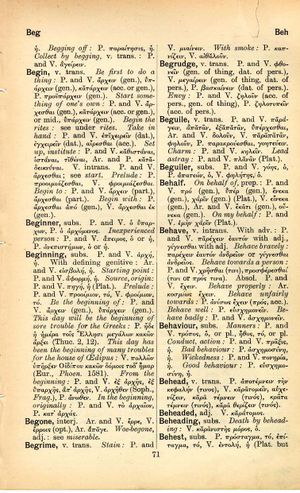beginning: Difference between revisions
From LSJ
(Woodhouse 2) |
(CSV3) |
||
| Line 1: | Line 1: | ||
{{ | {{Woodhouse1 | ||
| | |Text=[[File:woodhouse_71.jpg|thumb|link={{filepath:woodhouse_71.jpg}}]]'''subs.''' | ||
P. and V. αρχή, ἡ. | |||
<b class="b2">With defining genitive</b>: Ar. and V. [[εἰσβολή]], ἡ. | |||
<b class="b2">Starting point</b>: P. and V. [[ἀφορμή]]. ἡ. | |||
<b class="b2">Source, origin</b>: P. and V. [[πηγή]], ἡ (Plat.). | |||
<b class="b2">Prelude</b>: P. and V. [[προοίμιον]], τό, V. [[φροίμιον]]. τό. | |||
<b class="b2">Be the beginning of</b>: P. and V. ἄρχειν (gen.), ὑπάρχειν (gen.). | |||
<b class="b2">This day will be the beginning of sore trouble for the Greeks</b>: P. ἥδε ἡ [[ἡμέρα]] τοῖς Ἕλλησι μεγάλων κακῶν ἄρξει (Thuc. 2, 12). | |||
<b class="b2">This day has been the beginning of many troubles for the house of Œdipus</b>: V. πολλῶν ὑπῆρξεν Οἰδίπου κακῶν δόμοις τοδʼἦμαρ (Eur., ''Phoen.'' 1581). | |||
<b class="b2">From the beginning</b>: P. and V. ἐξ ἀρχῆς, ἐξ ὑπαρχῆς, ἀπʼ ἀρχῆς, V. [[ἀρχῆθεν]] (Soph., <b class="b2">Frag.</b>), P. [[ἄνωθεν]]. | |||
<b class="b2">In the beginning, originally</b>: P. and V. τὸ [[ἀρχαῖον]], P. κατʼ ἀρχάς. | |||
}} | }} | ||
Revision as of 09:23, 21 July 2017
English > Greek (Woodhouse)
subs.
P. and V. αρχή, ἡ.
With defining genitive: Ar. and V. εἰσβολή, ἡ.
Starting point: P. and V. ἀφορμή. ἡ.
Source, origin: P. and V. πηγή, ἡ (Plat.).
Prelude: P. and V. προοίμιον, τό, V. φροίμιον. τό.
Be the beginning of: P. and V. ἄρχειν (gen.), ὑπάρχειν (gen.).
This day will be the beginning of sore trouble for the Greeks: P. ἥδε ἡ ἡμέρα τοῖς Ἕλλησι μεγάλων κακῶν ἄρξει (Thuc. 2, 12).
This day has been the beginning of many troubles for the house of Œdipus: V. πολλῶν ὑπῆρξεν Οἰδίπου κακῶν δόμοις τοδʼἦμαρ (Eur., Phoen. 1581).
From the beginning: P. and V. ἐξ ἀρχῆς, ἐξ ὑπαρχῆς, ἀπʼ ἀρχῆς, V. ἀρχῆθεν (Soph., Frag.), P. ἄνωθεν.
In the beginning, originally: P. and V. τὸ ἀρχαῖον, P. κατʼ ἀρχάς.

